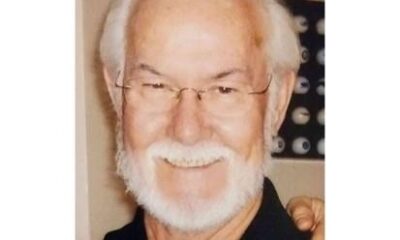Columns
BRIDGES: The Bizarre Governorship Of Xenophon O. Pindall

To achieve the heights of a profession often takes hard work and determination. Sometimes it is achieved entirely by accident. And this was the case with the bizarre governorship of Xenophon O. Pindall, who served for nearly two years as acting governor.
Pindall was born in Monroe County, Missouri, in 1873. It is a very rural county most well-known for being the birthplace of famed author Mark Twain. His father was a colonel in the Confederate Army during the Civil War and an attorney. At a young age, the family relocated to Desha County, Arkansas. His childhood was one marked with tragedy. He watched his three brothers all die in childhood.
His father, who himself would enjoy a successful political career, sent the younger Pindall to local schools in Desha County and eventually to a military school in Missouri. He attended Central College in
He set up a law firm in Desha County and married in 1902. The same year, he won his first election to the state legislature. Voters were satisfied with his work and re-elected him in 1904. He ran for attorney general in 1906. At this time, party candidates were selected at the state convention rather than by primary election. Delegates narrowly chose William F. Kirby, a future U. S. Senator, over Pindall. He quietly accepted the results and returned home.
However, fate intervened again. In early 1907, the newly elected State Sen. Howard Robb, who represented Drew and Desha counties, suddenly died. A special election was held, and Pindall won the special election to fill the remainder of the term.
In 1906, while Pindall was nursing his political wounds, Congressman John S. Little was elected governor. He was a kindly man with a reputation for integrity. Unfortunately, he was also plagued with ill health. Little was beset with a string a debilitating illnesses not long after his inauguration in January 1907. This caused problems as he spent most of his time at his home in Greenwood while the legislature was underway. On February 11, he decided to leave Arkansas for Texas, hoping to recover his health. As Arkansas did not have a lieutenant governor at this point, the line of succession fell to the President of the State Senate, John I. Moore of Phillips County.
Little’s health worsened, and he announced his resignation a few days later. Moore was technically only acting governor, as state law did not allow for the position of governor to be filled on a permanent basis in case of resignation or other causes. Moore served competently through the remainder of the legislative term. Among the last pieces of business of any regular session of the legislature is the election of officers for the next term, including Speaker of the House and President of the Senate. Pindall, having just won a term in the state senate, impressed his colleagues, who voted him to be the new President of the State Senate.
Because of a quirk in the rules, the term of the outgoing senate president ended with the end of the regular legislative session, which fell on May 14, 1907. Moore was still considered to be a part of the state senate and only the acting governor. As a result, since his term as state senate president ended, he was no longer acting governor. Since the term of the new President of the State Senate had now begun, that made Xenophon Pindall the new acting governor until a new governor would be elected.
As acting governor, he signed into law the state’s first pure food and drug law, protecting the state’s foods and medicines from contamination. He also enacted a law banning price discrimination, protecting farmers and consumers alike. Most of his time in office was filling administrative functions such as filling appointments to state commissions and boards, various ceremonial duties, and issuing pardons.
His term in the state senate ended on January 11, 1909, as the new legislative session opened. However, it would be three more days until the newly elected George Donaghey would be inaugurated as governor. So in the intervening period, the new President of the Senate, Jesse Martin of Pope County, served as acting governor for three days.
Pindall’s improbable rise to the governorship gave a new impetus to reformers in the state to bring back the office of lieutenant governor, which had briefly existed during Reconstruction. After Gov. Joseph T. Robinson resigned in March 1913 to become a U. S. Senator, after only two months as governor, the same pattern surrounding Pindall threatened to begin again. An orderly transfer of power was needed. However, this office would not return to the state until 1927.
Pindall would never again serve in elected office. After his state senate term ended in 1911, he quietly returned to his law practice, with branch offices in both Little Rock and Arkansas City. He never ran for election again. Pindall met an untimely and tragic death on January 2, 1935. He was walking along the bluffs along the Arkansas River when he slipped and fell to the rocks below. He was 61.
Columns
KINGDOM ETHIC: Hunger and Thirst

Matthew 5:6 says, “Blessed are those who hunger and thirst for righteousness, for they shall be satisfied.”
Jesus spoke these words about righteousness to ordinary men and women during His famous “Sermon on the Mount.” Shortly afterward, He told them, “Unless your righteousness surpasses that of the scribes and Pharisees, you will not enter the kingdom of heaven.”
Both statements must have been confusing to His listeners. First, what does our basic need for food and drink have to do with righteousness? Second, how could an average person possibly exceed the righteousness of the highly respected, God-appointed holy men known as Pharisees?
Jesus went on to teach more truths that relate to this topic. In John 6, He declared that He is the Bread of Life, and that unless we eat His flesh and drink His blood, we have no life in ourselves. He also taught that those who do this abide in Him.
By “eating” His body and “drinking” His blood—symbols of the atoning elements of Christ’s sacrifice on the cross—we acknowledge our ongoing need for Him, just as we need food to sustain physical life. Too often, salvation is viewed as a one-time transaction, but the reality is that we are continually being saved and rely on His body and blood for ongoing spiritual nourishment. This is how our righteousness surpasses that of those who simply keep the law, for it is Christ’s righteousness that does indeed surpass that of the Pharisees. Partaking in His body and blood, we partake in His righteousness and there fulfill His command to surpass.
Hunger and thirst are fundamental human needs. They are also daily needs, as Jesus alluded to in this same sermon through the famous “Lord’s Prayer.” In the same way, our need for the righteousness provided by the broken body and shed blood of the Lord is also a daily need. This doesn’t mean we must be “saved” every day, but rather that He is our daily sustenance and the One who sustains our spiritual life.
St. Augustine of Hippo once said, “Recognize in this bread what hung on the cross, and in this chalice what flowed from His side.” A true Christian can no more cease to hunger and thirst for Christ than we can stop hungering and thirsting for physical food and drink.
Perhaps the pervasive dissatisfaction within much of Christian society today stems from feeding ourselves with what gratifies us momentarily but never truly satisfies our deeper spiritual hunger. As the Psalmist writes, “For he satisfies the thirsty and fills the hungry with good things” (Psalm 107:9).
Columns
BRIDGES: From Arkansas to Hollywood, this man made his mark

Arkansas musician Scott Bradley was never widely known outside of the studio, but his music was the heart of some of the most iconic American cultural icons of the twentieth century, most notably, the famed cartoon duo of Tom and Jerry.
Bradley was born in Russellville in 1891. He developed a love of music early and taught himself. By the 1910s, he headed to Houston to put his musical talents to work. He found work as a conductor for orchestras and theaters throughout Southeast Texas as well as radio stations. At the same time, he continued to write his own music. Though he was a successful musician, Bradley still took lessons from more experienced musicians to fine-tune his own craft.
By the early 1920s, California was rapidly becoming the heart of the entertainment world. Bradley left Texas in 1926 to become a conductor for a Los Angeles radio station. In 1929, he was hired by The Walt Disney Studio as a staff musician. However, Walt Disney had a falling out with some of his staff in 1930. One of Disney’s chief animators went to form his own cartoon studio for which Bradley worked for several years.
By the 1930s, the cartoon short feature had become a staple part of the moviegoing experience. Audiences expected to see a cartoon and perhaps another short film and a newsreel showing current events in addition to the previews of coming attractions and the main feature film. Seeing the success of Disney and others with the growing popularity of animation, Metro-Goldwyn-Meyer Studios decided to form its own cartoon studio in 1937 to compete. Bradley was quickly hired to help provide the music.
In 1940, MGM animators William Hanna and Joseph Barbera created the Tom and Jerry cartoon, though they were originally named Jasper and Jinx. Bradley went on to write and conduct the large orchestras for the music in the 114 original cartoons made between 1940 and 1957.
Since Tom and Jerry almost never spoke, most of the stories relied on Bradley’s music to set up and underline the different jokes, playful tensions, and transitions from one scene to the next. The physical humor and lack of dialogue helped make the cartoons immensely popular around the world as Bradley’s music needed no translations.
One 1947 cartoon in particular, “The Cat Concerto,” placed music at the center of the episode as Tom played a concert pianist whose piano happened to be Jerry’s home. Jerry got his revenge against Tom as he tried to finish his concert with increasing desperation. Thanks to Bradley’s music direction, the cartoon won the 1948 Academy Award for Best Animated Short Film, the fourth consecutive Academy Award for Tom and Jerry.
Bradley also composed the musical score for the 28 Barney Bear cartoons made by MGM between 1939 and 1954. Bradley would also go on to provide the music for the 24 Droopy cartoons produced between 1943 and 1957 and the Screwy Squirrel cartoons made in the late 1940s.
In 1957, MGM closed its cartoon studio as part of a corporate restructuring effort. Though MGM would continue to produce cartoons, the large budgets were gone and an entirely new group of directors, animators, and musicians were hired. Bradley’s contract was cancelled; and at the age of 65, he decided to retire. In those nearly two decades of the first batch of Tom and Jerry cartoons, Bradley was part of a team that earned eleven Academy Award nominations and won eight Academy Awards for the cartoons. Overall, he composed 250 cartoon music scores.
By the mid-1960s, television stations across the United States were airing Tom and Jerry cartoons first shown in theaters. Though edited from their original screen versions, the cartoons were an immediate sensation with children. Because of this, by the 1970s, new Tom and Jerry cartoons began to be produced strictly for television.
Bradley died at his home in California in 1977 at the age of 85 as a new generation of youngsters discovered in television reruns the cartoons he helped bring to life. A compilation album of his musical scores from some of these cartoons was released in 2006. Today, these cartoons continue to be seen on television and on video daily in homes around the world.
Columns
KINGDOM ETHIC: Meekness

Meekness is difficult to define and even harder to put into practice. If someone told you to be merciful, you would likely know what that entails. However, if someone told you to be meek, you might need to pause and consider which actions truly demonstrate meekness.
I believe the best way to explain meekness—understood as gentleness, humility, and lowliness—is to consider its opposite. The clearest illustration of this contrast is found right here in this very Beatitude.
Jesus is speaking to a crowd of Israelites gathered on a hillside overlooking the Sea of Galilee. It is a time of harsh Roman occupation, and Israel is longing for a Messiah who will literally liberate them from Roman control, reestablish Israel’s sovereign rule over the land, and form a tangible—not merely theoretical—Jewish kingdom.
Rome is ruthless, known throughout history for conquering and dividing. The Romans use force and might to expand their empire, claiming new lands and daring the weaker former inhabitants to resist. As the Roman historian Sallust noted, “The Roman people won empire through war, not by negotiation or treaty.”
Imagine the mental struggle of the Hebrew listeners that day when Jesus, speaking to a people eager to reclaim their “earth”—or perhaps the greek could be better translated, “land”—says, “The meek…will get the land back.” In other words, you can’t out Rome, Rome at its own game to regain your land. There is a better way, the way of The Kingdom and it’s upside down ethics, and it’s the opposite of Rome’s method. While Rome seized land by force, you will inherit it through meekness.
Meekness is not about fighting the enemy in the same way the enemy fights you; it’s about trusting God to fight your battles and grant you, by inheritance, what He has promised.
As Psalm 20:7 reminds us, “Some trust in chariots and some in horses, but we trust in the name of the LORD our God.” This is the essence of meekness.
Columns
BRIDGES: Born with dreams of success

Ottaway W. Gurley was an Arkansas man with a dream of success. The son of slaves, he would become a multi-millionaire and one of the richest African-Americans in the country. He would also helped create the prosperous Greenwood District in Tulsa, known as “Black Wall Street,” until it all came crashing down in 1921.
Gurley was born on Christmas Day 1868 to freed slaves in Huntsville, Alabama. Shortly afterward, the family moved to Pine Bluff where Gurley grew up. Pine Bluff offered many opportunities for the freedmen of Arkansas with a new state college established for African-Americans, schools, and a growing business community. He was intelligent, ambitious, and determined. He attended local schools and worked as a school teacher for a time in the latter 1880s. He married in 1889 and began working for the post office.
Gurley knew that in spite of the relatively comfortable life he had built, his options were limited in the South. Like many Americans of the time, he looked to the west for his future. In September 1893, the federal government opened up six million acres of Cherokee lands in the northern part of the Indian Territory (modern-day Oklahoma). Gurley and his wife were among 100,000 participants in the land rush, and Gurley staked a claim near the city of Perry, a mostly black community. Though the lands had just been seized from the Native American tribes, many African-American leaders saw the potential to build their own communities in a new land, hopefully free from segregation and the influences of the Jim Crow South. He worked tirelessly to develop his land and his business interests. He ran and lost a race for Noble County Treasurer but nevertheless persisted and came to own a prosperous store and became principal of the local school.
In 1905, with oil booming in nearby Tulsa, Gurley sold everything and bought a small tract on the north end of the city. He started a grocery store and subdivided his tract for residential and business development. The street began to be called Greenwood Avenue after the city in Mississippi. He started a rooming house which he expanded into a hotel and began several other businesses. He built several buildings and homes and soon became a multi-millionaire, worth possibly as much as $60 million in 2025 dollars.
As more African-Americans came to Tulsa, Gurley’s establishments became the center of the growing business community. The area began to be called the Greenwood District, but the prosperity of the neighborhood and the success of so many black business owners led to it being called “Black Wall Street.” Though segregation was now the law in Oklahoma, the area was thriving and self-sufficient and eventually included a hospital, newspapers, churches, and schools. With fellow businessman J. B. Stoddard, the pair had created an economic marvel.
Gurley eventually became Deputy Sheriff for Tulsa, as he worked with the mostly white city government and police force. Tensions were growing in the city nevertheless, with increased reports of lynchings across the state by 1921. When a black man was accused of raping a white woman in late May, a mob surrounded the local jail demanding retribution. Fearing a lynching, a group of armed Greenwood residents marched to the jail to protect the accused. Gurley attempted to negotiate with white leaders to try to prevent an outbreak of violence, but his effort failed. Fights broke out around the jail, and a riot ensued, one that would engulf Greenwood.
On June 1, white mobs formed and attacked the neighborhood, beating and murdering as they marched up one street after another. The whole district was set aflame. Some witnesses even reported that airplanes were used to drop gasoline bombs on homes and businesses. Gurley watched his own buildings burn and barely escaped with his life.
In the end, more than 250 people were dead, and the Greenwood District was in ruins. Many of the bodies were never recovered. Most of the residents fled in a panic as one block after another succumbed to vicious mobs and unrelenting fires. In the final indignity, the remaining black residents of the district were marched out of Tulsa at gunpoint by members of the Oklahoma National Guard, with some briefly interned in camps outside the city. It was not until decades later that the State of Oklahoma even acknowledged what had happened or even attempted to compensate property owners for their losses.
But with his dreams in ashes and his fortune gone, Gurley moved further west. He and his wife eventually reached Los Angeles, where they spent their remaining years running a modest hotel in the South Central neighborhood. Gurley died in 1935.
Columns
CHESTER PASSMORE: Kingdom Ethic, Poor In Spirit

No one wants to be poor. In fact, most things in our world are designed around achieving success to avoid poverty. Basic human reasoning across generations has encouraged mankind to improve their circumstances. Education, family legacy, hard work, and good fortune are all things we strive to enhance for ourselves, our children, and future generations.
So why does the King of the Kingdom of Heaven begin by instructing us to be poor?
Yes, His instruction refers to a specific kind of poverty: being “poor in spirit.” But what does that mean? What is the essence of this countercultural, upside-down wisdom?
In my estimation, to be poor in spirit is to live in humble dependence upon God. You can have nothing, or you can have everything, and still fail to live in dependence on Him. Self-sufficiency, particularly in the arena of our spirit, is the foundational aspect of Phariseeism, or any form of religion that relies not on God but on one’s own abilities.
Self-righteousness, however, is no righteousness at all.
I believe the Beatitudes work in succession—you must build them one upon another. A humble, dependent spirit is the bedrock for adopting the posture of mourning. From there, you can truly be meek, which leads to a hunger and thirst for righteousness, and so on.
The point is this: Jesus’ teaching about the way of the Kingdom begins with being poor in spirit. This is where it all starts. Everything else is built upon this foundation. If you can’t be poor in spirit, the rest of the Beatitudes will never take root.
It’s a misconception to think one can be truly merciful without first being poor in spirit.
How do we approach God and our salvation? In a state of humility, recognizing our great need for Him and His salvation. If this isn’t the foundation of our salvation, we risk moving forward in a form of religion that places ourselves—our works and our self-importance—at the center of our relationship with Jesus.
You never outgrow your need for God. From the beginning of your spiritual journey to the very end, you remain just as spiritually dependent on Him. True maturity is growing in the awareness of how deeply we rely on the King.
It is those dependents, those perpetual beggars, who are promised the Kingdom.
“Blessed are the poor in spirit, for theirs is the kingdom of heaven.”
-

 News2 months ago
News2 months agoEl Dorado man killed in single vehicle crash
-

 Regional News2 months ago
Regional News2 months agoRadio DJ known as “Roy D. Mercer” passes away Friday
-

 Obituaries2 weeks ago
Obituaries2 weeks agoParker Hammett, Addis LA
-

 Sports2 months ago
Sports2 months agoHampton Bulldogs hire new head football coach
-

 News4 months ago
News4 months agoJunction City woman killed in Nevada County accident
-

 News1 month ago
News1 month agoRobin J. Carroll, Former Prosecutor and Judge Passes at Age 54
-

 News4 weeks ago
News4 weeks agoEL DORADO POLICE DEPARTMENT RELEASES REPORT ON DEATH OF 19 YR OLD
-

 News1 month ago
News1 month agoEl Dorado Manufacturer Named Arkansas Business of the Year






















































